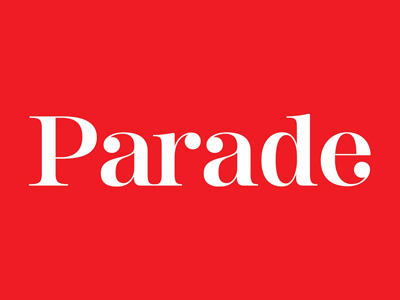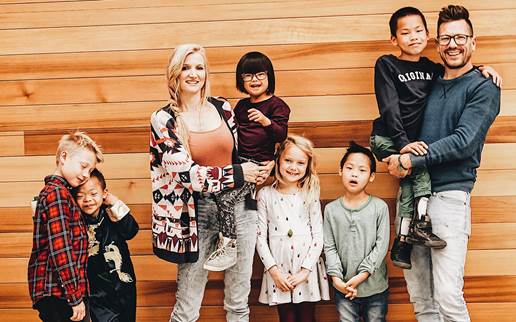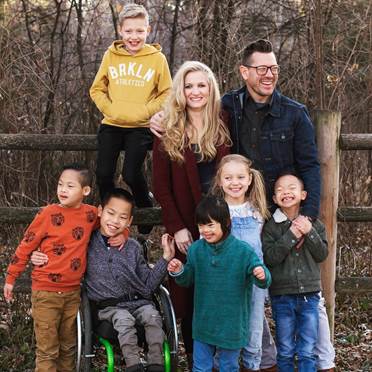Boise Boys: Boise Boys’ Luke Caldwell on Adopting Special Needs Children: ‘Love Is the Connection’

Boise Boys‘ Luke Caldwell on Adopting Special Needs Children: ‘Love Is the Connection’

The phrase opposites attract comes to mind when you watch Clint Robertson and Luke Caldwell, the friends behind HGTV’s Boise Boys. Caldwell brings his refined interior design savvy to the show, while Robertson (the contractor/attorney/CPA) focuses on practicality, functionality and their bottom line. The two have formed a relationship that thrives revitalizing and flipping homes in Boise. But what stands out the most is the foundation on which both have grown as business partners, friends and television stars: family.
“We are so different, Luke and I, but we’re both rowing the boat in the same direction,” Robertson says. “We both have that love in our heart for our families, and I think it’s those core values that keep us glued together and going in the same direction.”
For Luke, that direction changed course a few years back after he and his wife, Miranda, welcomed their first two children, Elias, 10, and Brighten, 8.
“We felt like we really hit the lottery with a boy and girl. We knew that there were so many kids who didn’t have homes and didn’t have families, and we wanted to consider adopting. We came to the conclusion that we wanted to adopt kids who most likely wouldn’t ever be adopted. That became our focus — giving a child a home and a family.”
Over the years, they’ve grown their family to include Morris, 11, Tucker, 9, Darla, 7, and Ezra, 10, all four of whom were adopted from the same orphanage in China.
“What I love about Luke is his heart,” says Robinson. “He believes that every child should have the love of a family. And you better look out — he’s going to make sure every child in the world has a family.”
In April, ahead of the season 2 premiere of Boise Boys, Miranda and Luke headed to the Ukraine, where they will soon be adopting their seventh child, Promise, a 15-year-old.
Has adopting children always been your plan?
My wife and I both were exposed really early on in life to adoption, to other countries and other places. I think one of the greatest things my dad ever did for me was take me to India when I was 12 years old. He was working on starting some orphanages in India, and I tagged along. I spent three weeks there just hanging out with with some of the orphans every day. I brought an American football, and we just played catch or read Bible stories, and I just tried to be a friend. I left completely changed — it was so hard for me to understand why they were abandoned. Why their parents didn’t want them. In America, if you can’t raise your child, there’s a foster care system and government in place to help assist these children. In a lot of countries, kids don’t have that choice. They don’t have that opportunity. After we got married, we waited five years to have our own kids, but I think we always knew that we wanted to adopt. We just didn’t know when.
How did you figure out the when?
My wife was on tour with me and with the two kids, and one night, she told me she had a vision. And not to over spiritualize it, but she said she felt like there was a little 5 or 6-year-old Chinese boy sitting next to her. Miranda started looking over websites of kids that were available for adoption in China and praying for them. She really started connecting with this little boy who couldn’t walk — they said he had spina bifida. She said every time she would look at him, she would start crying. Fast forward eight months later, and she felt the urge to check his birthday. She told me his birthday is November 17. She said, “Remember that day eight months ago that I had that vision? I looked back at your tour schedule, and that was November 17.” I said he’s our boy. We knew that he would be our son.
And you named him Morris? What was it like visiting the orphanage and bringing him home?
Yes, it was an amazing experience. We met one of his best friends, Jin Jahn, who has Down syndrome. When we took Morris home and started communicating, he asked us if we would go back to adopt his best friend because he wants him to come play with his toys. He’s so sweet. But because Jin Jahn had Down syndrome, he didn’t have a file. It’s expensive for them to produce.
But every step of the way, we’ve prayed for clarity because it’s a big decision. And you know it’s scary when you think about how it could impact your own kids. And so my wife prayed that Jin Jahn would get a file. And about two weeks later, she checked the website and he had one available. We ended up going back and adopting Tucker, what we named him. And while Miranda was in China getting Tucker, they came downstairs with a little girl, and they said you need to come back and adopt her. And we did, we ended up adopting her, Darla, a sweet little girl also with Down syndrome. With her, we adopted another little boy who always looked after her, Ezra, we named him.
When you’ve brought your children home to Boise, how have you helped them adapt to this new life?
You know there’s not an easy answer. Ultimately, the simple answer is love. There’s so many variables with every child, they’re all different and they’ve been through so much you don’t even know about. Three of our kids don’t communicate very well yet, and you can’t have deep conversations just yet. But love is the connection. You connect with the kids through quality time and through love and letting them know that you’re there for them. And it’s amazing, you can’t be trained for it. It just happens. I was worried. I thought it was going to be hard for me to love our adopted kids as much as our biological kids. You just worry that it’s going to be different. But it just isn’t. Not even an ounce.
How do you stay positive and optimistic, knowing that while you’re giving your children a new life, there’s so much out there to still be done?
We’re still trying to figure out what the answer to that is in our own family. We want to be a voice to those who don’t have a voice, and we want to bring awareness to it all. We want to help people realize that they have a lot to give. And this could be a huge blessing in your life. The greatest thing you can do in your life is to love others, not yourself. Our culture tells us the exact opposite, and that’s why people aren’t fulfilled. But when we choose to love others, it changes us. It gives us true purpose and meaning in life beyond a pay raise or possessions. I’m not trying to say that we’re saints, because we’re not. We have struggles and issues like everyone else. But we’re willing and we’re open to being a voice for those who don’t have one.

